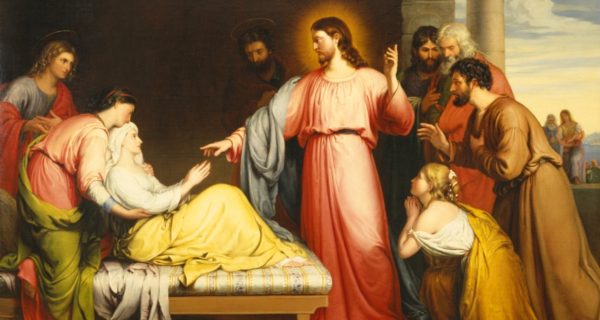“Jesus told him, ‘Go your way; your faith has saved you.’ Immediately he received his sight and followed him on the way.”
Marvelous, the ease with which Jesus, the Son of God, cured the sick, healed the lepers, gave sight to the blind and raised the dead. Yet, these scenes which the Gospels set before us ought to prompt us to ask certain questions. For example, if Jesus is the Messiah and these miracles point to his power over life, why does he not heal us all? Would that not confirm that he truly is the messiah…to cure all people of their suffering and pain? If he is God, and he loves us, why does he not heal us all of our infirmities, sinfulness and suffering?
There are two answers to this question.
Obviously, if Jesus did not heal all people, he must see –quite contrary to the world’s understanding- value in suffering! Is that not a radical statement? How can we visit local hospitals or even our homes where we care for the sick and witness the pain and suffering of our brothers and sisters and believe there is value in that suffering? How can we watch reports from war torn regions of the world on the news or be aware of millions of persons who suffer from starvation, disease or violence and believe there is value in suffering? How can we consider our own personal trials or the struggles of our families and believe that there is value in suffering?
We can do so because we are Christian and we do not see the world like other people. Venerable Charles de Foucauld, no stranger to suffering himself can assist us here: “Jesus chooses for each person” he wrote, “the type of suffering which He sees is the most suited to sanctify that person, and often the cross which Jesus imposes is the one which, accepting all the others, one would have refused if one had dared. The one Jesus gives is that which one understands the least.”
Of course, the key in this statement is that Jesus uses suffering to sanctify the person. Those who suffer have a deeper understanding of life, they are more compassionate, they are more at peace, they have a natural knowledge of prayer, they know what it is to persevere and they are, indeed, very holy.
If we return to our original question, the answer is now obvious. Jesus did not cure all people of their physical or emotional suffering because it is by suffering that he makes us holy, more human, and more like himself. Why do good people suffer? So that they may become better.
Now this might lead us to ask a further question. If there is value in suffering, why, then, did Jesus heal at all? It is a good question that leads to profound understanding of Jesus as God. Throughout the Gospels, Jesus did not work miracles for the sake of working miracles. Each time he reached out to heal or to cure or to raise from the dead, he did so in order to teach us valuable lessons.
Without a doubt, his miracles were very real (contrary to that which some teach today), but they point to deeper realities… they are in a sense, signs. For example, in the Gospels, Bartimaeus throws off his cloak and cries out “Jesus, son of David, have pity on me!” And he is given his sight. For Bartimaeus it is a miracle, for us it is a lesson. Just as Bartimaeus throws of his cloak, we are to throw off the things of this world and beg Jesus for our sight…not physical in our case, but spiritual. If we could be healed of our spiritual blindness, a world would open up to us like we could have never comprehended before.
Jesus is the Divine Doctor ready to heal us of much more than physical ailments! Listen closely to his question to Bartimaeus: “What do you want me to do for you?” Now, not to be foolish, but if a young person at McDonald’s asks you that question, “What do you want me to do for you?”, you think of fries, hamburgers, and Coke. If a bank teller asks “What do you want me to do for you?”, you think of deposit and withdraw, loans and interest rates. If a politician asks you, “What do you want me to do for you?”, you think of lowered taxes, better education, lowering crime, and national security.
But when it is Jesus Christ, Our Lord, Son of God, master of the universe who asks you, “What do you want me to do for you?”, you think: do for me what nobody else in the universe – no other power, authority or principality – is capable of doing for me: heal me, pardon my sin, and grant abundant life!
We must believe in our Christian hearts that Jesus stands before us and asks us the same question he asks Bartimaeus, “What do you want me to do for you?”
Can you not see our savior standing before you eager to ask you the same question?
Can you, in your heart, hear Jesus ask, “What do you want me to do for you?”
And what will be our response? What do we really want from Jesus: more money, more power, a better career, popularity, or even less pain, strife and struggle? No, if it is the Savior who asks, we beg him for MERCY, we beg him for PEACE, we beg him for ETERNAL LIFE…
Jesus came to heal, to free, to give sight to the blind, and to raise the dead and to give “suffering” redemptive power. But most importantly, he came to give life to the sinner, to return us to the love of the Father, and to give us life in abundance.

